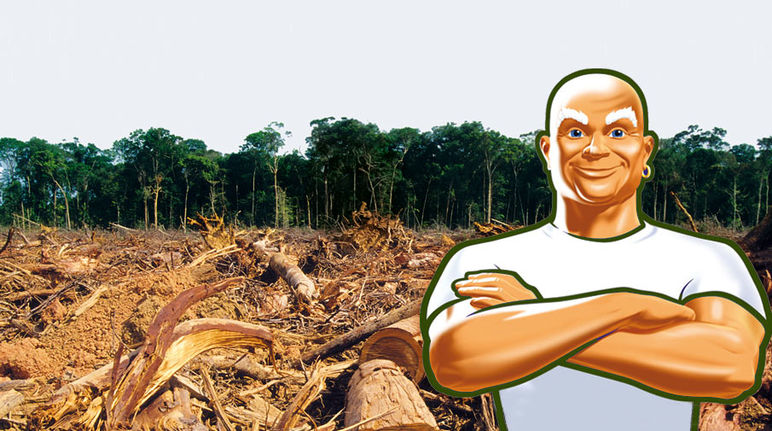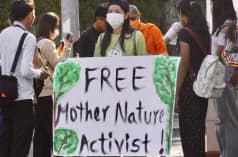P&G pledges to protect the forest – once it’s gone
 Procter & Gamble still condones rainforest destruction for palm oil (background: iStockphoto; montage: Rainforest Rescue) (© Montage: Rettet den Regenwald / iStockphoto)
Procter & Gamble still condones rainforest destruction for palm oil (background: iStockphoto; montage: Rainforest Rescue) (© Montage: Rettet den Regenwald / iStockphoto)
Procter & Gamble (P&G) is the corporation behind brands like Mr. Clean, Head & Shoulders, Gillette and Oil of Olay. It has pledged to use only deforestation-free palm oil – as of 2020. Please speak out and tell P&G that 2020 is too late – the remaining forest will be gone by then!
Call to actionTo: Procter & Gamble CEO Alan G. Lafley
“P&G intends to stop buying dirty palm oil by 2020. This commitment is pure greenwashing. P&G must eliminate palm oil from its supply chain immediately.”
Procter & Gamble’s suppliers have left a trail of destruction across vast stretches of Indonesia. Producers such as BW Plantation, KLK and Musim Mas have become synonymous with rainforest destruction and the killing of orangutans. It cannot be ruled out that dirty palm oil from traders such as Wilmar International and Cargill is entering the P&G supply chain – and thus our households.
Satellite images analyzed by Greenpeace document clear-cutting in the pristine rainforests of Papua by PT Rimba Matoa Lestari (PT RML), a P&G supplier. According to Greenpeace, PT RML has been destroying forest in a 30,000-hectare concession since 2009, and has continued doing so in the very recent past.
BW Plantation has been clearing the rainforest in several areas in central Kalimantan that are inhabited by orangutans. Their habitat is also being destroyed by the palm oil producers KLK and Musim Mas. On the Rokan Adi Raya concession, the fate of the last Sumatran tigers hangs in the balance.
P&G has pledged that its suppliers must document the sources of their palm oil as of 2015, and the corporation intends to dispense entirely with oil from deforestation as of 2020. For many areas, that will be too late – the rainforest will be gone by then. In Indonesia, palm oil plantations currently occupy 10 million hectares. 20 million hectares are projected for 2020 – a doubling of the area in only six years!
Given the dramatic pace at which the rainforest is being destroyed, Procter & Gamble’s continued use of dirty palm oil until 2020 reveals its “no deforestation” pledge to be mere greenwashing. How long are we going to stand for P&G’s double-dealing?
Call on CEO Alan G. Lafley to commit to an immediate stop to P&G’s use of palm oil.
BackgroundP&G processes 460,000 tons of palm oil and palm kernel oil a year.
The group’s brands include Head & Shoulders, Oil of Olay, Gillette, Oral-B, Ariel, Lenor, Mr. Clean, Always, Pampers, Vicks and Duracell.
To: Procter & Gamble CEO Alan G. Lafley
Dear Mr. Lafley,
Procter & Gamble is committed to eliminating deforestation from its palm oil supply chain by 2020. Your suppliers thus have a further six years of free rein to clear land for palm oil plantations. This is intolerable given the dramatic pace at which they are destroying the rainforest.
It will be too late for many areas if you continue to condone deforestation until 2020 – the rainforest will be gone by then. In Indonesia, palm oil plantations currently occupy 10 million hectares. 20 million hectares are projected for 2020 – a doubling of the area in only six years!
Even the immediate implementation of your announced no-deforestation policy would not solve the problems, as palm oil cannot be produced sustainably for many reasons. We therefore call on you to eliminate palm oil from your supply chain immediately.
Sincerely,
The issue – rainforest on our dinner tables and in our fuel tanks
At 66 million tons annually, palm oil is the most commonly produced vegetable oil. Its low world market price and properties that lend themselves to processed foods have led the food industry to use it in half of all supermarket products. Palm oil can be found in frozen pizzas, biscuits and margarine, as well as body creams, soaps, makeup, candles and detergents.
Few people realize that almost half of the palm oil imported into the EU is used as biofuel. Since 2009, the mandatory blending of biofuels into motor vehicle fuels has been a major cause of deforestation.
Oil palm plantations currently cover more than 27 million hectares of the Earth’s surface. Forests and human settlements have been destroyed and replaced by “green deserts” containing virtually no biodiversity on an area the size of New Zealand.
The impact – suffering and death in producer countries, climate havoc
The warm, humid climate of the tropics offers perfect growth conditions for oil palms. Day after day, huge tracts of rainforest in Southeast Asia, Latin America and Africa are being bulldozed or torched to make room for more plantations, releasing vast amounts of carbon into the atmosphere. As a consequence, Indonesia – the world’s largest producer of palm oil – temporarily surpassed the United States in terms of greenhouse gas emissions in 2015. With their CO2 and methane emissions, palm oil-based biofuels actually have three times the climate impact of traditional fossil fuels.
Palm oil is not only bad for the climate: As their forest habitat is cleared, endangered species such as the orangutan, Borneo elephant and Sumatran tiger are being pushed closer to extinction. Smallholders and indigenous people who have inhabited and protected the forest for generations are often brutally driven from their land. In Indonesia, more than 700 land conflicts are related to the palm oil industry. Human rights violations are everyday occurrences, even on supposedly “sustainable” and “organic” plantations.
As consumers, we are largely unaware of these broader issues, yet our daily palm oil consumption also impacts our health: refined palm oil contains large amounts of harmful fatty acid esters that are known to damage DNA and cause cancer.
The solution – a revolution on our dinner tables and in our fuel tanks
Only 70,000 orangutans still roam the forests of Southeast Asia, yet the EU’s biofuels policy is pushing them to the brink of extinction. Every new plantation on Borneo is destroying a further piece of their habitat. Stepping up the pressure on policymakers is a must if we want to save our tree-dwelling kin. Apart from that, however, there is still a lot we can do in day-to-day life.
Follow these simple tips to recognize, avoid and combat palm oil:
- Enjoy a home-cooked meal: Use your imagination: why not try almond-coconut-pear biscuits? Or pizza with potato and rosemary? A meal cooked from fresh ingredients beats processed foods containing palm oil every time. Oils such as sunflower, olive, rapeseed or flaxseed are ideal for cooking and baking.
- Read labels: As of December 2014, labeling regulations in the EU require food products to clearly indicate that they contain palm oil. However, in the case of non-food items such as cosmetics and cleaning products, a wide range of chemical names may still be used to hide the use of palm oil. A quick check of your favorite search engine will turn up palm oil-free alternatives, however.
- Remember that the customer is king: Ask your retailers for palm oil-free products. Write product manufacturers and ask them why they aren’t using domestic oils. Companies can be quite sensitive to issues that give their products a bad name, so inquiring with sales staff and contacting manufacturers can make a real difference. Public pressure and increased awareness of the problem have already prompted some producers to stop using palm oil.
- Sign petitions and write your elected representatives: Online campaigns put pressure on policymakers responsible for biofuels and palm oil imports. Have you already signed all of Rainforest Rescue’s petitions?
- Speak out: Protest marches and creative action on the street raise public and media awareness of the issue, which in turn steps up the pressure on policymakers.
- Leave your car at home: Whenever you can, walk, ride a bicycle or use public transport.
- Be informed and inform others: Big Business and governments would like us to believe that biofuels are good for the climate and that oil palm plantations are sustainable. Spread the word – share this information with your family and friends and encourage them to rethink their consumption habits. It’s in our hands!













 Recent successes
Recent successes